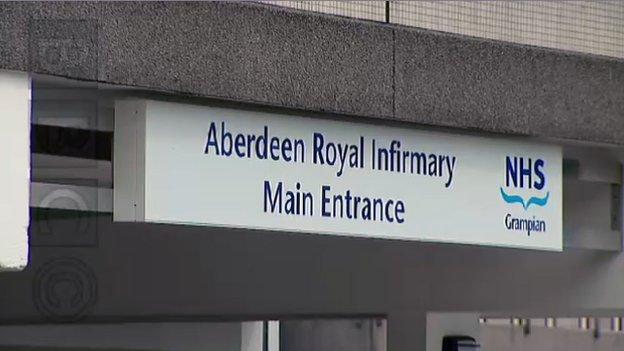Operations cancelled at NHS Grampian due to nurse shortage
- Published

NHS Grampian has had to cancel routine operations because of a shortage of theatre nurses.
At least 183 procedures have been cancelled at hospitals across the north-east since the beginning of November, the health board said.
They include 13 procedures due to take place at Aberdeen Royal Infirmary since 1 January.
The health board blamed "staffing challenges and winter pressures, not budgetary constraints".
It said it had problems filling vacancies due to complex training requirements of theatre nursing but procedures were only rearranged as a "last resort".
A patients' group raised concerns that elderly patients were being affected disproportionately because of the lack of staff with specialist skills.
Recruitment problems
The Patient Action Co-ordination Team, which provides support to patients in Grampian, said orthopaedics and eye surgery for conditions such as cataracts are among those worst affected.
It said that because these are ailments which predominantly affect older people, they are worst affected by the number of cancellations.
The patients group also warned that the cancellations will affect the north-east health authority's waiting time target performance.
Dr Annie Ingram, director of workforce at NHS Grampian, said: "We've made huge progress over the last year but, like other public sector organisations in Grampian, we face challenges in recruiting."
"We apologise to any patients whose procedures have had to be re-scheduled."
'Safe practice'
She said that around 30,000 operations are carried out every year in the region and the number which are postponed is usually between 1 and 2%.
"Rearranging elective procedures is a last resort for us and is done according to clinical prioritisation: our most clinically urgent patients will still be seen," she added.
"When providing staff for a theatre list of operations on any given day, the theatre nurses must meet the needs and skills required for that speciality and have enough knowledge to act as a skilled practitioner to maintain safe practice.
"Vacancies have been difficult to fill due to the requirement to try and train staff in what is a complex area of nursing.
"Normally when staffing is at a sufficient level, staff rotate specialties, gaining more knowledge and skills in a variety of different areas and subsequently building more resilience into the service."
- Published4 August 2016

- Published2 June 2016
